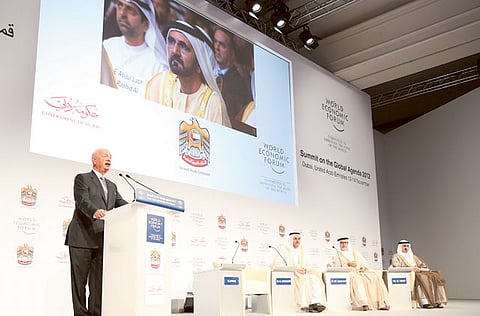Dubai’s optimistic approach represents global spirt
Speakers stress cooperation to solve global problems

Dubai: Dubai has a very optimistic approach towards global economic problems, Klaus Schwab, Founder and Executive Chairman of the World Economic Forum, told Gulf News on the sidelines of the Summit on the Global Agenda.
His Highness Shaikh Mohammad Bin Rashid Al Maktoum, Vice-President and Prime Minister of the UAE and Ruler of Dubai, attended the Plenary Session of the Summit of the Global Agenda Councils along with Shaikh Hamdan Bin Mohammad Bin Rashid Al Maktoum, Dubai Crown Prince, and Shaikh Maktoum Bin Mohammad Bin Rashid Al Maktoum, Deputy Ruler of Dubai.
The Summit was attended by 1,000 leaders from 80 countries, who have gathered to participate in 88 Agenda Councils.
Schwab said: “Dubai in some way represents the spirit of the world.”
The openness, diversification and multi-faceted example of Dubai entitles the city to be the heart of finding solution to the world problems, he added.
“It is very important to discuss global challenges in an integrated comprehensive way because we are in a globalised completely interdependent world.”
In his keynote speech, Sultan Bin Saeed Al Mansouri, UAE Minister of Economy, said: “The discussions in Dubai serve as a backdrop for preparing a concrete strategy for positive change at the World Economic Forum Annual Meeting in Davos-Klosters next year.”
Sharing some of the UAE growth experiences, he added: “Our growth engines are our non-compromising commitment to innovation and entrepreneurship. “
“Today, the UAE is the only Arab country defined as an ‘innovation driven economy’ in the World Economic Forum Global Competitiveness Report 2012-13.”
“Our GDP is over Dh1 trillion, and last year we recorded a growth of about 4 per cent, a trend that is expected to prevail this year as a result of the government’s policy of diversifying sources of income, and investment in development projects. In this context, it is worth noting that the contribution of oil to the GDP is only 29 per cent.”
While the world is witnessing rapid changes on the political, economic, commercial, media and cultural levels, Al Mansouri added: “A partnership between rich and poor countries, large and small and medium enterprises and between global organisations and specialised organisations must be formed.”
“It is essential to reinforce these partnerships with practical steps to find appropriate solution and success. Actions are needed to narrow the gap between rich and poor countries.”
The Summit outcome should contribute to building the world, ending poverty and illiteracy, and seeking to build prosperous communities, Al Mansouri highlighted.
Anwar Gargash, the UAE Minister of State for Foreign Affairs, said: “The current difficult situation of the world economy is the top priority of the world’s interest.” “While there are clear recovery indications, the world economy has not regained full confidence yet,” he added.
“The 88 world councils in this summit should cooperate to provide the best recommendations and to develop the best solutions in the face of the current challenges on the global agenda such as the rise of conflicts, the future of governance, financial obstacles, banking and other regional issues related to Africa, Arabs, Europe and other regions.”
As Europe and the US still suffer from economic turmoil, the GCC countries, Africa and East Asia have played the role of the main engine for world economy, Gargash remarked in his speech.
However, there are a lot of challenges that these counties are facing such as shortage in natural resources, unemployment that should be taken into consideration, according to him.



